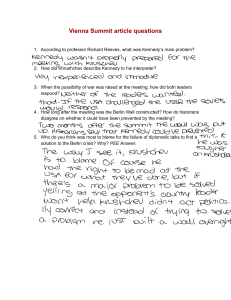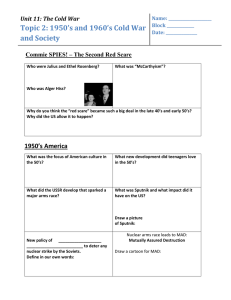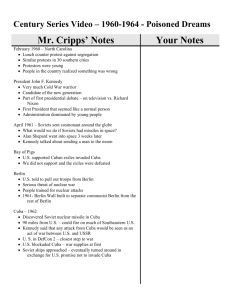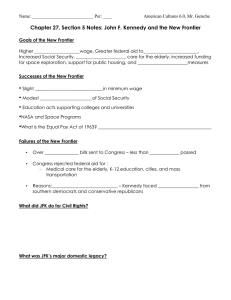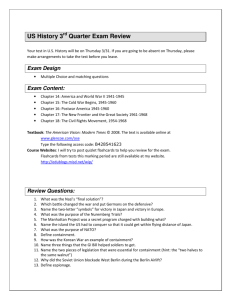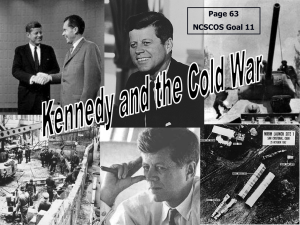The Kennedy and Johnson Years Mr. Bernich, US II Enriched
advertisement
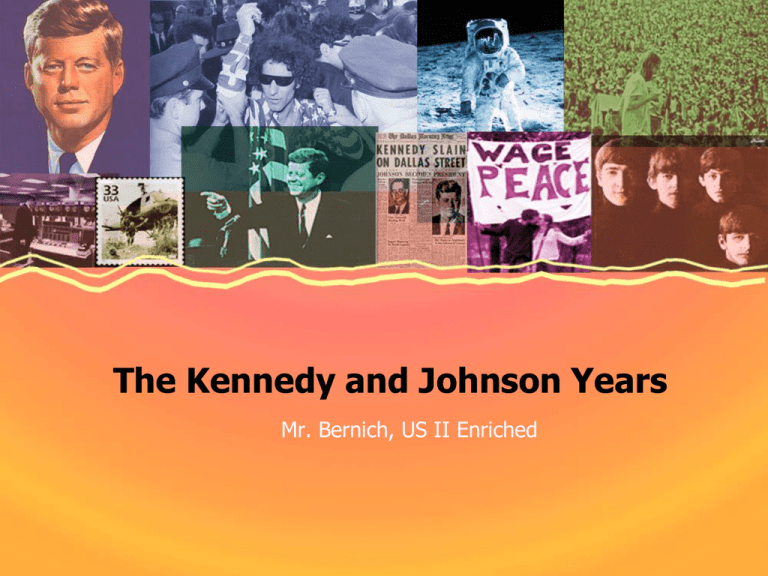
The Kennedy and Johnson Years Mr. Bernich, US II Enriched American Royalty JFK and his wife, Jacqueline, built a style in the White House that for latter generations would be referred to as “Camelot”. During his term in office, JFK and his beautiful young wife, Jacqueline, invited many artists and celebrities to the White House The press loved the Kennedy charm and JFK appeared frequently on T.V. THE BEST AND THE BRIGHTEST JFK surrounded himself with what one journalist described as the “best and the brightest” available talent Of all of his elite advisors who filled Kennedy’s inner circle, he relied most on his 35-year-old brother Robert, whom he appointed attorney general RFK was John’s closest friend and advisor • Eisenhower approved a CIA plan to train anti-Castro exiles for an invasion • 4/17/1961- 1,500 exiles landed, however no air support • Invasion plan failed Bay of Pigs Invasion • 1200 survivors were captured and traded a year later for $53 million worth of U.S. medicine and supplies. • Made Castro stronger • saw this as a sign of U.S. weakness Cuban Missile Crisis • Nikita Khrushchev sent nuclear-armed missiles to Cuba, as well as the technical and military personnel to install and operate them. • Kennedy addressed the nation and announced a naval blockade of Cuba • Khrushchev backed down and offered to remove the missiles under U.N. supervision and we promised never to try to invade Cuba again • Khrushchev lost prestige • Kennedy emerged as more mature • Led to less tension between nations diplomacy • “hotline” installed for emergency communication Effects of the Cuban Missile Crisis The Soviet Union removes missiles from Cuba The United States removes missile from Turkey The U.S. and the Soviet Union avoid nuclear war In 1963 The U.S. & Soviets, & Great Britain sign the Nuclear Test Ban Treaty Berlin Wall • In the 11 years since the Berlin Airlift, almost 3 million East Germans (Soviet side) had fled into West Berlin (U.S. controlled) to flee communist rule • The Soviets did not like the fact that East Berliners were fleeing their city for the democratic West • Their departure hurt the economy and the prestige of the USSR • Just after midnight on August 13, 1961 the Soviets began construction of a 90-mile wall separating East and West Berlin • Kennedy orders troops into West Berlin • Neither side claims victory Key to image: 1. East Berlin 2. Border area 3. Backland Wall 4. Signal fence 5. Different kind of barriers 6. Watch towers 7. Lighting system 8. Column track 9. Control track 10. Anti-vehicle trenches 11. Last Wall, known as the "Wall" 12. Border 13. West Berlin New Frontier Initiatives of the Kennedy Administration Military •Increased military spending •Supported a “flexible response” policy Economics •Passed the Equal Pay Act of 1963 improving wages for women •Increased minimum wage •Improved the nation’s welfare system •Embraced policy of deficit spending Civil Rights •Introduced civil rights legislation in 1963 to provide money for school desegregation, and prosecute voting rights violations Space Exploration •Declared the U.S. should commit to landing a man on the Foreign Aid •Created the Peace Corp in 1961; aided developing nations moon by 1970 w/ infrastructure & provided workers who lived in the And then there was the Zapruder film, taken by an onlooker at the time of the assassination, which convinced many conspiracy theorists - as well as much of the public - that Oswald could not have acted alone. The motion of the head backward appears that the bullet entered through the front of the head - not the back. Thus to many viewers, there had to be a second gunman The Warren Commission After the report was issued, 53% of the public agreed with the Commission's conclusions, but the report was filled with inconsistencies. The Commission concluded that 3 shots were fired within 5.6 seconds, and yet some say that it takes 3 seconds to reload the gun (to put the next bullet in place -there is disagreement on this point). In conclusion – Lee Harvey Oswald acted alone Oswald was shot by Jack Ruby The Great Society: Civil Rights Civil Rights Act of 1964 • Outlawed discrimination in voting, education, & public accommodations (hotels, restaurants, etc) • Equal Employment Opportunity Commission created to fight discrimination in hiring • Title VII – prohibited discrimination based on sex The Great Society: Education Elementary & Secondary Education Act • gave federal funds to poor schools to improve libraries, language laboratories, & other services • Increased funding for Indian, inner city, & Mexican-Am schools The Great Society: Poverty 1964 Economic Opportunity Act • Job Corps- trained men & women between ages 16-21 in work skills to get better jobs • VISTA- Volunteers in Service to Americaserved in inner-city schools, Indian reservations, rural health clinics, & urban hospitals • Head Start – funds provided for play groups, day care, & activities to help underprivileged kids get ready for elementary school The Great Society: Healthcare Amended the Social Security Act • Medicare for the elderly (65 or older) provided basic hospital insurance • Medicaid provided basic medical services for the poor & disabled who were not already in the Social Security system The Great Society: Immigration Immigration & Nationality Act of 1965 • Altered the quota system to allow over 300,000 new immigrants into the country Major Decisions of the Warren Court Voting Rights • Baker v Carr (1962) – • Mandating the redrawing of state districts was within the power of federal courts • Reynolds v Simms (1964) • Districts must be drawn based on current census data Major Decisions of the Warren Court Rights of the Accused • Mapp v Ohio (1961) • Evidence obtained from an illegal search could not be used in a criminal trial • Gideon v Wainwright (1963) • If a person accused of a crime could not afford a lawyer the state must appoint one to them • Miranda v Arizona (1966) • Being questioned by police, suspects must be informed of their right to keep silent, as well as to have an attorney • Escobedo v Illinois • an accused criminal had the right to a lawyer before they were questioned and any evidence obtained from the suspect who had not been informed of their rights could not be used in court Major Decisions of the Warren Court Separation of Church and State • Engle v Vitale (1962) • Recitation of prayer in public schools was a violation of the 1st Amendment’s Establishment clause • Abington v Schempp • Bible reading for religious purposes in public schools violated the First Amendment
